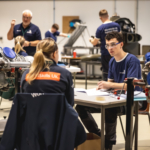When it was introduced last year, the Baker clause represented a breakthrough for careers advice and the skills sector in England. For the first time, providers were given a legal right to interact with school pupils thinking about their post-16 choices. As a former UK Education Secretary, Lord Baker, whose name the clause carries, recognised the disadvantage that technical routes faced: it was not that pupils did not want to take forward these kind of careers, it was often that they did not have access to the appropriate level of guidance to help them make informed choices. So the clause came into effect, as the former skills minister for England and current Westminster Education Select Committee Chair, Robert Halfon said, ‘for a very good reason – it’s vital that more is done to promote technical education’. A year on from the clause’s introduction, a new report from the IPPR think tank suggests that it is not fulfilling its promise. Only two-fifths of schools in England are complying with the clause, and of those that are, many are not allowing skills providers to access all pupils but are instead selecting those that they do not feel will progress into the sixth form. The implication here is that technical education is for ‘less able’ pupils. While this is clearly worrying, we have the means to help address it.
We know that the academic route has enjoyed a preference over the technical route in the context of careers advice for decades. If we are to redress this imbalance, expanding the range and quality of information that pupils, teachers and parents receive is a necessity. I am struck by the number of people I meet who assume that technical skills are not for the brightest pupils and that if a young person does not go onto academic study post-16 then that must be as a result of some kind of failure. I explain time and time again that Team UK, the high fliers who represent us at international skills competitions, is full of very talented young people who chose to pursue a technical education route, not for a lack of the best exam results, but because they found their passion and ultimately a career. Team UK, and thousands of other young people in technical training routes are finding their way there in spite of, not because of, the right signposting from their schools. But too many are not – and this has to change.
Whilst the Baker clause has direct relevance to England, the lessons we can learn from it so far relates to experiences that are common across Scotland, Wales and Northern Ireland too. Helping teachers and parents improve their knowledge of technical skills and careers is vital. At WorldSkills UK, we really do believe in the concept of seeing is believing: at our annual WorldSkills UK LIVE event – the nation’s biggest and best skills and careers show – we put that concept to the ultimate test. The results from our survey of teachers and parents who attended LIVE in November last year shows the benefits.
Over 80% of parents in attendance agreed that LIVE provided insightful information on technical and vocational skills. A similar number agreed that the event was an important part of young people’s careers education. Encouragingly, two-thirds of parents said that LIVE had helped young people understand what would be expected of them in the world of work.
Second only to parents in shaping young people’s views about the world of work are their teachers, so they need facts to encourage young people to make informed choices. Over 90% of teachers who attended were satisfied with their experience at LIVE. Two-thirds felt that attending had improved their knowledge of technical education and careers; and 90% agreed that learning by doing – the LIVE model – is a good way to engage with young people.
The implications of these findings are clear: the more parents and teachers learn about career options, the more we can go about dispelling some of the myths that persist about technical education. This way, the Baker clause’s intention will be given fuller effect and we can help unlock the potential of thousands more young people each and every year.
The IPPR’s report makes a number of its own sensible recommendations to expand the body of technical skills knowledge available to young people, but we should not overlook the role that young people themselves can play here. It is this principle on which our Skills Champions programme is built. The greater access that our Skills Champions – the young role models who have graduated from our skills competitions and are now sharing their experiences with others – are given to schools across England, Scotland, Wales and Northern Ireland, the greater the exposure to careers advice that could transform young people’s experiences. Our Skills Champions know what it takes to succeed and in trials with schools in England we have 75% approval rates from teachers and students alike when they’ve been visited by a Champion to talk about the world of work. If we could embed this peer learning programme on a UK-wide basis, it could make a significant additional contribution to the popular ways of finding out about careers such as family/friends, teachers and, of course, events like LIVE.
An exceptional amount of good work is being done by governments across the UK in terms of promoting apprenticeships and technical careers. But we cannot be complacent in the face of skills shortages in the economy. We need to change the conversation so that we are helping more young people find their passion first and then the right pathway to follow. WorldSkills UK can help parents and teachers support more young people in making informed career choices. This won’t just help realise the aims of the Baker clause, it will help deliver on the real potential of thousands and thousands of young people across the UK.


